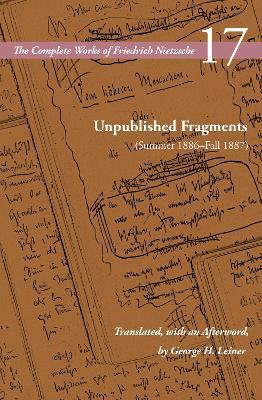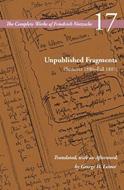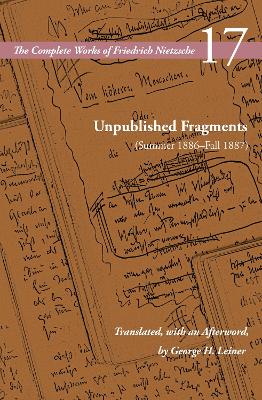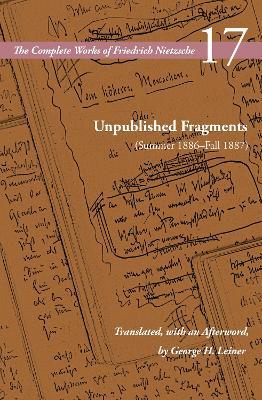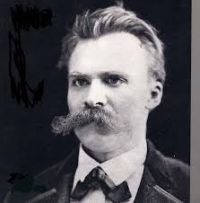Unpublished Fragments (Summer 1886–Fall 1887): Volume 17
The Complete Works of Friedrich Nietzsche will publish in its entirety, for the first time, an English translation of the full contents of the Kritische Studienausgabe. This volume of the Complete Works provides the first English translation of Nietzsche's unpublished notes from Summer 1886 through Fall 1887. In these writings we find drafts of new prefaces for the second editions of his earlier works, notes for the soon-to-appear On the Genealogy of Morality, and crucially, fragments and plans for an anticipated "master work" under the title "The Will to Power." This projected work, as is now well-known, was never written by Nietzsche; instead, it was fraudulently assembled by his sister Elisabeth Förster-Nietzsche and his friend Heinrich Köselitz (aka Peter Gast) and published under Nietzsche's name after his death. Only now, with the publication of this volume and the ones that precede and follow it, are English readers able to examine for themselves the full set of unpublished writings of the last creative period of Nietzsche's life. Taking into account the latest editorial work on his final notebooks, and including a detailed account by Mazzino Montinari of Nietzsche's decision not to complete a "master work," this volume documents the evolution of Nietzsche's thinking on such important themes as nihilism, eternal recurrence, and the revaluation of all values as it presents his late Nachlass free from the distortions perpetrated against it over a century ago.
-
Autore:
-
Traduttore:
-
Curatore:
-
Editore:
-
Collana:The Complete Works of Friedrich Nietzsche
-
Anno:2025
Le schede prodotto sono aggiornate in conformità al Regolamento UE 988/2023. Laddove ci fossero taluni dati non disponibili per ragioni indipendenti da Feltrinelli, vi informiamo che stiamo compiendo ogni ragionevole sforzo per inserirli. Vi invitiamo a controllare periodicamente il sito www.lafeltrinelli.it per eventuali novità e aggiornamenti.
Per le vendite di prodotti da terze parti, ciascun venditore si assume la piena e diretta responsabilità per la commercializzazione del prodotto e per la sua conformità al Regolamento UE 988/2023, nonché alle normative nazionali ed europee vigenti.
Per informazioni sulla sicurezza dei prodotti, contattare productsafety@feltrinelli.it
